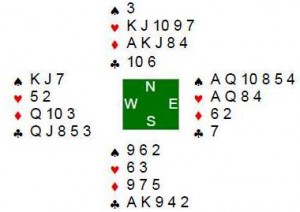Terence Reese was probably the all-time great name in British bridge, both as a player and a writer. Born in 1913 he won the Bermuda Bowl in 1955 and the World Par Contest in 1961. He also won four European Teams Championships. Tragedy struck in the Bermuda Bowl of 1965 in Buenos Aires when he and his partner Boris Schapiro were accused of cheating. The British inquiry found them not guilty but Reese’s enthusiasm for playing bridge never really recovered. However, his writing thrived and he was the author of more than twenty books on the game, Reese on Play and The
Expert Game being considered classics. He died in his home in Hove, Sussex in 1996.
WHEN opponents bid unexpectedly high you have to ask yourself: does my hand contain any nasty surprises?
I take as my text (as the preachers say) a problem set by Howard Schenken in a 1971 Bridge World:
Both sides are vulnerable at IMP scoring and the dealer is North. South holds:
North Deals Both Vul. South helds:
♠ 9 6 2
♥ 6 3
♦ 9 7 5
♣ A K 9 4 2
West North East South
1♥ 1♠ Pass
2♠ 3♦ 4♠ ?
What call do you make? The great majority of the American panel were ready to double, some with confidence, such as:
Begin: Double. Throwing out the possibility of slam (which, I agree, could be on) I think I might get this for
800. Partner might even sneak in a club ruff.
Clarke: Double. If partner has the tops in his suits it is difficult to see how the opponents can escape for less than 800. If partner has two long red suits lacking some of the tops, I think he will pull my double.
Howard was not impressed by this argument. When opponents bid unexpectedly high you have to ask yourself: does my hand contain any nasty surprises for them? Obviously not. East knows he hasn’t got the ace and king of clubs.
There was a big majority for the double, though in many cases there was not much confidence. Thus:
Wolff: Double. I’d lead a trump. It looks as if East has one of partner’s suits stacked. To not double is too much like tiptoeing through the tulips.
That’s an entrancing picture of the rotund Robert.
Weiss: Double. The double is a two-way action and North should not be averse to moving out of it with a strong two-suiter.
In favour of a pass:
Roth: Pass. I didn’t push them into game. I’ll be satisfied to beat them.
Rubens: Pass. A double without a trump honour would be an insult to East.
There was also some support for bidding on: five diamonds, even five clubs. Howard observed that these
bidders fell into two groups: far out, and far, far out. I must say that I don’t think the 1971 panel distinguished itself. The most likely construction of East’s hand is that he has six good spades and strong hearts. The full hand might be something like this:
Whether you double or not – Howard considered it close – it is very important to lead a trump, not a heart or the ace of clubs. A trump lead (or a diamond and a trump back) is good enough, just. East wins and leads his singleton club, taken by the king. You play another round of trumps. If East takes this in dummy and runs the queen of clubs, discarding a diamond, you will play a third round of trumps, holding the declarer to nine tricks.
My BOLS bridge tip is: When opponents bid unexpectedly high, ask yourself if your hand contains any nasty surprises.
